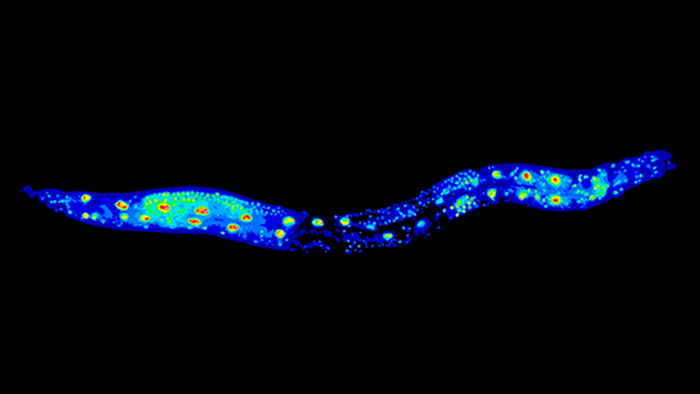Longer life due to faulty RNA processing
The roundworm Caenorhabditis elegans is an important model organism in ageing research. The worm in the image is labelled with GFP::RNP-6. Credit: Max Planck Institute for Biology of Ageing
RNA is an important transmitter of information in our cells and serves as a blueprint for the production of proteins. When freshly formed RNA is processed, so-called introns are cut out to produce the mature mRNA coding for protein. This cutting is called “splicing” and is controlled by a complex called the “spliceosome”.
Long-lived worms
“We found a gene in worms, called PUF60, that is involved in RNA splicing and regulates life span,” says Max Planck scientist Dr. Wenming Huang who made the discovery. Mutations in this gene caused inaccurate splicing and the retention of introns within specific RNAs. Consequently, lower amounts of the corresponding proteins were formed from this RNA. Surprisingly, worms with this mutation in the PUF60 gene lived significantly longer than normal worms.
Particularly affected by this defective production were some proteins that play a role in the mTOR signalling pathway. This signalling pathway is an important sensor for the availability of food and serves as a control centre of cell metabolism. It has long been the focus of ageing research as a target of potential anti-ageing drugs. The researchers were also able to show in human cell cultures that reduced levels of PUF60 activity led to lower activity of the mTOR signalling pathway.
PUF60 mutation in humans
“We think that by altering the fate of introns in RNAs, we have discovered a novel mechanism that regulates mTOR signalling and longevity,” says Max Planck Director Adam Antebi who led the study. “Interestingly, there are also human patients with similar mutations in the PUF60 gene. These patients have growth defects and neurodevelopmental disorders. Perhaps in the future, these patients could be helped by administering drugs that control mTOR activity. But of course, this needs more research.”
The article “Decreased spliceosome fidelity and egl-8 intron retention inhibit mTORC1 signaling to promote longevity” has just been published in Nature Aging.
21/09/2022




COMMENTS ARE OFF THIS POST